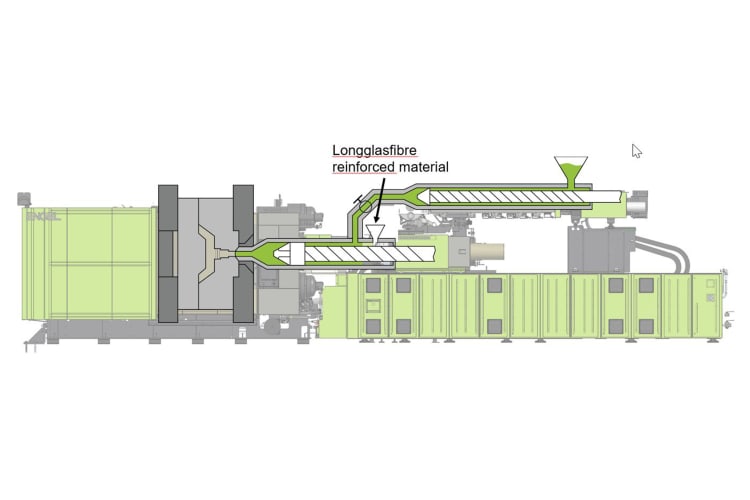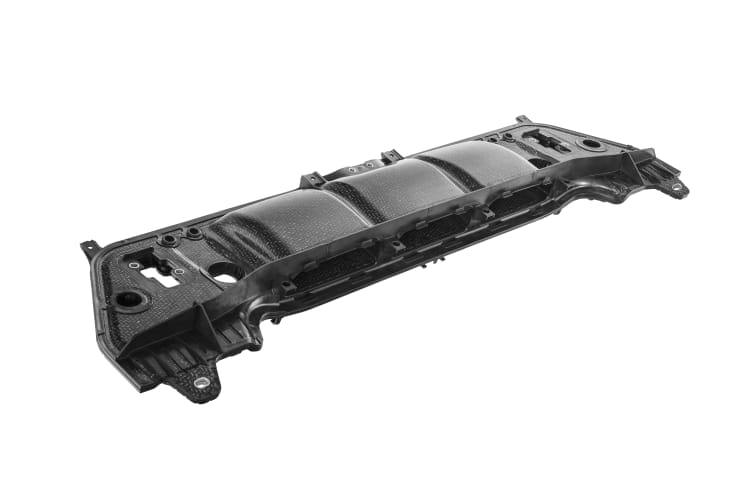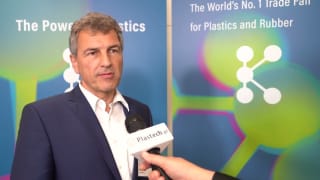Efficient lightweight composites with thermoplastics
Lightweight plays a central role in achieving climate protection targets. At its own interdisciplinary technology centre for lightweight composites at the St. Valentin production plant in Austria, Engel has been developing innovative composite solutions in cooperation with partner companies for more than ten years. The primary development goal is integrated and automated processes for cost-efficient high-volume production.
One focus of the development work is on the use of thermoplastic fibre composite materials. “The reasons for this are the highly efficient processes for processing thermoplastics on the one hand, and greater sustainability on the other”, says Füreder. An approach which consistently relies on thermoplastic material paves the way for recycling the parts later on.
In the Engel organomelt process, thermoplastic fibre composite prepregs – for example, thermoplastic sheets and UD-Tapes – are shaped and functionalised in a single integrated step. To achieve this functionalisation, reinforcing ribs or assembly elements are moulded immediately in the same mould after thermoforming using a thermoplastic from the same matrix material group as the thermoplastic sheet.
The first high-volume production application of this technology went live in 2018 at Valeo Front End Modules in Smyrna, Tennessee, USA. Starting with thermoplastic sheets, Valeo Front End Modules manufactures front end carriers with integrated air ducts for a German brand name OEM at its plant. The systems solution supplied by Engel for automated high volume production consists of an Engel duo 1700 injection moulding machine, three Engel easix articulated robots for preparing large quantities of metal inserts and for handling the thermoplastic sheet, an Engel viper 90 linear robot and an Engel IR oven.
The double-shell structure made it possible to integrate the air ducts directly into the carrier structure. The two half-shells are produced in a one-shot process. To do this, the two thermoplastic sheets are simultaneously heated in the IR oven, and then inserted into the mould, where they are formed and functionalised.

In the Engel organomelt process, Valeo Front End Modules manufactures front end carriers with integrated air ducts for a German brand name OEM in Smyrna, Tennessee.
Innovative recycling for fibre composite parts
Recycling fibre-reinforced composite parts is another development focus at the Engel Technology Centre for Lightweight Composites. "In the future, we expect automotive recycling to play a role in returning many fibre-reinforced parts made of polyamide and polypropylene to the material cycles in a single grade process. However, the glass fibres are shortened when the parts are shredded. To again produce high-quality fibre composite parts from the returned materials, new fibre material does need to be admixed during processing of the recycled materials," as Fischer explains. "We are working on a solution here that lets us tune the material properties in a very efficient way."The basis is the new Two-stage process which Engel presented at the K show 2022. To be able to integrate a melt filter and a degassing unit, the production cell brakes down plasticising and injection into two independent, but mutually tuned, process steps. Thanks to this strategy, plastic waste can be processed as flakes in injection moulding directly after grinding to achieve excellent quality. Since a complete processing step, repelletising, is eliminated, the Two-stage process saves a huge amount of energy and work compared to legacy recycling. In order to be able to reprocess shredded fibre-reinforced plastic composite parts to create vehicle parts capable of withstanding high mechanical loads, Engel is now integrating a glass fibre feed into the production cell solution in addition to the melt filter. The fresh long glass fibres are admixed before injecting the melt. "We are in the trial phase here," says Fischer. "Initial trials are very promising."

The new Two-stage process by Engel separates plasticising from injection. This opens up new opportunities for recycling of long glass fibre reinforced parts. (Picture: Engel)




